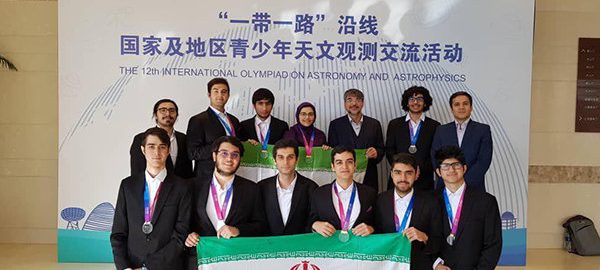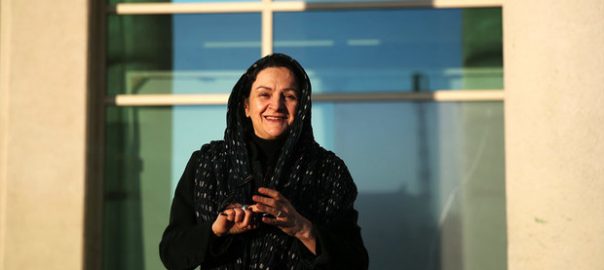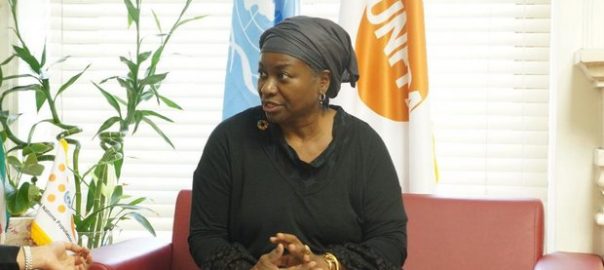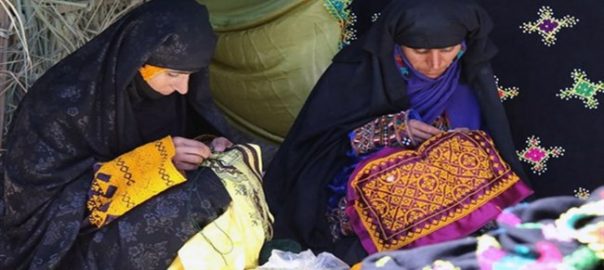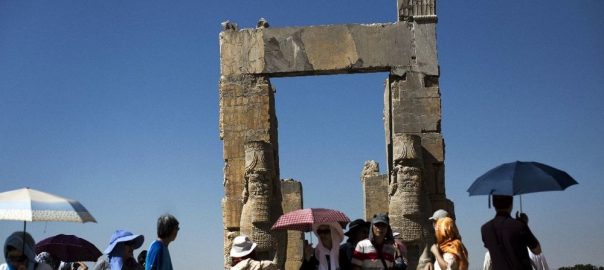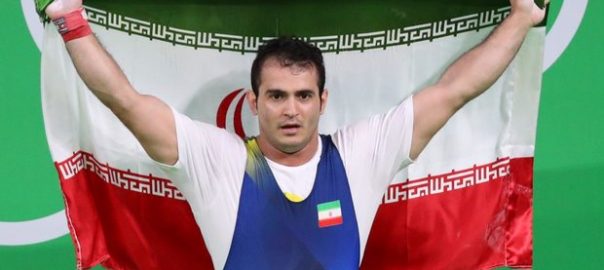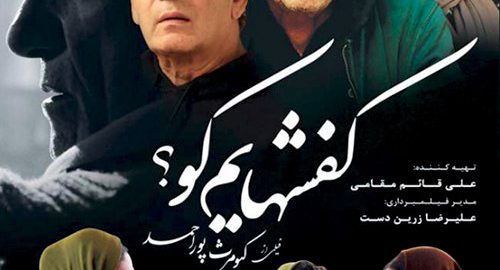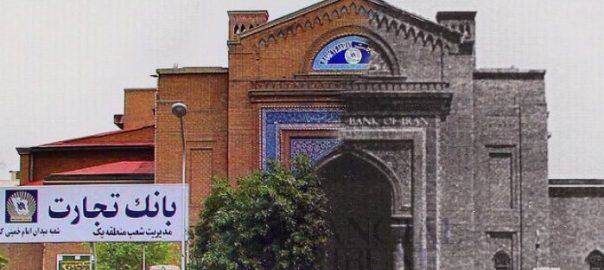Iran achieved MDG 5 [United Nations Millennium Development Goals] by being the 9th country with the lowest maternity death worldwide, the executive director of the United Nations Population Fund (UNFPA) said in an exclusive interview with the Tehran Times.
It’s a big achievement because to end the death during childbirth is a goal that UNFPA has set for the whole world – or, as we say, zero maternal deaths. There are just a handful of countries who have achieved this milestone, Dr. Natalia Kanem said.
“We have to trust women to make choices in planning their families,” a key message from the Executive Director of UNFPA.
“The woman should be the one to decide, and of course it’s natural for the woman to confer. This is the whole point: We have to trust women to make these decisions because the woman is one half of a couple and is the one who bears a child; the woman also understands how many children she already has and she also understands her responsibilities for looking after the next generation,” Dr. Kanem explained.
Dr. Kanem travelled to Iran to attend the HelpAge Asia-Pacific Regional Conference on Population Ageing which was held in Tehran from October 23 to 25, with the main theme of “Family, Community and State in Ageing Societies.”
UNFPA is the United Nations sexual and reproductive health agency. Its mission is to deliver a world where every pregnancy is wanted, every childbirth is safe and every young person’s potential is fulfilled.
Here is the full text of the interview:
Based on the latest census figures in 2016, older persons currently constitute almost 9 percent of the total population in Iran and demography experts predict that by 2050 some 20 to 30 percent of the population will be 60 years or older. How can this inevitable demographic transition be addressed with regard to the Sustainable Development Goals?
Everywhere in the world have demographic challenges that are different from each other, of course. UNFPA is quite convinced that the demographic challenges that the world is facing are really closely linked to the issue of choice. The choices that we are making today are going to influence older people as they age, but they are also linked to the cycle of life. So those same choices have to do with how we deal with young people today. Demographic transition typically refers to the phenomenon that we see in populations. In earlier times, a high birth rate was accompanied by a high death rate. Many countries had the high birth rates, women often had 8, 10, even 15 children. Even in Iran, less than 50 years ago, birth and death rates were much higher than today.
People were dying at the age of 50 or 55 and this was considered normal – something we certainly wouldn’t consider normal today. But with development we see that as choices expand typically people would choose to have smaller families so that you can invest more in each child. And as advances in medical care, nutrition and quality of life occur then the death rate also comes down. So this is the demographic transition: you have high birth rate and high death rate and then slowly over time fewer and fewer children, but also people are living much longer. So all of these change the structure of the population.
In less developed countries where UNFPA is working – for example, in parts of Asia and Africa — the “many children paradigm” is still there. The death rate is still relatively high and so the structure of the population in those countries presents a different challenge.
Iran is a very good example of a country where you’ve had these advances in development and medical care. People are now living much longer- on average 20 years longer than a few decades ago- and it’s a big achievement for Iran and for similar countries. And of course [people are having] fewer children but more children are surviving and you are not having a lot of early deaths. Then when you’ve got to the stage where Iran is now and as you look to the year 2050, for the first time you are going to have a high proportion of older people.
At the meeting I attended here we joined other partners, including the government, to develop ideas, regionally, as to how we will address some of these challenges. The Sustainable Development Goals have that word “sustainable.” It means that it should be something that is going to endure over time. Sometimes you can fix things quickly but it’s not going to last. It’s a short-term Band-Aid [solution]. What the Sustainable Development Goals are talking about is prosperity that is going to be long-lasting into the future. So in thinking about the Sustainable Development Goals, there are 17 of them. Of course there are many noble goals of the United Nations embedded in them. Every country wants peace, wants to have productive partnerships, things like health, the end to poverty, the end to hunger, etc. This everyone can agree on. It is not an issue.
But there are some other interesting SDGs which are less known like the SDG 10 which is about an end to inequality; or the SDG 5 which talks about men and women and making sure that the services of the country, of a community and of a family cover both men and women. And as we think about the ideals of climate and the environment there are sustainable goals for water and life in the sea, and there are sustainable goals for agriculture and life on Earth.
For UNFPA the relevance of all of these goals to an ageing population is that you have to strengthen not just the body and mind but the attitude of everybody to understand the cycle of life. If the baby is healthy in the mother’s womb this is a stronger child who is going to be a stronger adult and who is going to avoid some of the health problems when they become 60-70 or 80 years old. But if you have no good nutrition, lots of diseases may occur and if there’s not an understanding about the relationship of men, women, older people and younger people in the family then as you get older you are not going to be well integrated into the society. You will suffer great loneliness which is a problem, which can be even a health problem, and you are also not going to be able to be productive. The big point that we make about the demographic transition is that older people can and should continue to contribute to society.
They contribute to their family, of course, because of love. But they can also contribute to their community economically by their wisdom that they have acquired over so much life experience and also to be able to give guidance to the next generation that’s coming up.
So in a nutshell we also want to stress that these Sustainable Development Goals stand for having a world that is just, and in that just world women are half the population and therefore women are half the solution. The solution to the economic problems, because prosperity comes with more women contributing and more women in the workforce. More women being supported by childcare and other things that are going to allow them to make their contributions all the better. The relationship between healthy old age and providing and planning and protecting women all along a chain makes a difference because women tend to outlive men, so when you look at the population over 60 typically there are more women than men as opposed to half and half. But normally women do not have the chance to have pensions, for example, so poverty among older people tends to have more women represented. These are the type of questions that the Sustainable Development Goals ask us to address and these were some of the things that were discussed in the conference.
How does UNFPA evaluate Iran’s effort to address population ageing including increased inclusion of the older persons in the community, making cities more accessible for them, and financial support for health services?
UNFPA has worked very closely with some of the ministries that are in the lead on thinking about the family. We were much honored to have with us the Vice President who has taken leadership on some of the issues on family dialogues that you are having in this country. It’s a very enlightened way of looking at problems that every society has by trying to encourage dialogue among the generations and also to think about family life and family relationships. Iran is doing well when it comes to concentrating on better health for all, including the challenges that you face because of the migrant population and other factors.
UNFPA’s role is to assist governments as we think of what are some of the measures that we can put in place. For example, if something like an earthquake or another type of natural disaster happens, usually women are more affected than men in any country, so UNFPA works with women and girls so that together with government, we can position lifesaving supplies and how we can assure that we are ready to assist the population if, God forbid, something happens in terms of a humanitarian crisis.
We also help government to analyze some of the trends that are happening in the population, not just ageing and but also on the other side of what’s happening with the younger people in the country. Iran has a highly educated population, including women who go to school. This is something that is a model for other countries in the region and UNFPA is helping to share the experience that you have had with other countries in the region. We’ve been very gratified and happy to see that when it comes to women’s health issues Iran takes them very seriously. Your midwifery programs have been very successful, so you have fewer deaths during childbirth than other areas which had started from the same indicators where Iran did.
Iran achieved MDG 5 [United Nations Millennium Development Goals] by being the 9th country with lowest maternity death worldwide. It’s a big achievement because to end the death during childbirth is a goal that UNFPA has set for the whole world – or, as we say, zero maternal deaths. But you are already there. There are just a handful of countries who have achieved this milestone and now we are working feverishly to try to share that example, in particular, the benefits of midwives and safe delivery and antenatal care. All of these are factors that helped Iran to have women survive. No woman should die while giving birth.
Of course there is always more to do and among these is trying to strengthen key policies; we are working with government and together we are encouraging policies that seek to address and end violence against women, for example, and there are other areas that we have been working on very closely with Iran.
In the UNFPA State of World Population 2018 report you mention that “choice can change the world”, could you please elaborate on that?
The State of World Population report was published just a few days ago [October 17]. In this report UNFPA analyses choices – including why choices are in short supply everywhere. We looked at every country and we were looking at fertility levels and number of children per woman and we noticed that in the countries that are still very poor and are trying to raise their economic prospects they still have very high fertility. Like I was describing before, women in such countries are having more children that they actually desire. When you have a big family you have big challenges especially in a poor country, so UNFPA is working together with governments to provide contraception and also information. So that women would be aware of the things that they could do safely in order to plan their family.
Now this type of guidance is not ‘one-size-fits-all.’ It has to be done sensitively; you have to work with the culture and religion and social norms of the country and you have to understand what it is that women prefer because it should be their choice. A simple example is if a women wants to use contraception to plan her family size it should not be just one type of contraception. You should have 5 or 6 or 7 modern methods of contraception for family planning, and she will pick the one that works for her and her husband.
Now on the side of countries where fertility is on average two or three children we’ve done an analysis to see choices there and choice is relevant because very often a woman does not have a choice to work; she would like to but there is not enough social support. If there is no grandmother to look after the children, for example, what is she going to do? If there is no consideration for all of the different options, she may have the education and she may have the preparation to achieve her potential, but she may not be able to ultimately participate in the economy of her country. And this is going to make sustainable development much more difficult.
And then we also talk about developed countries where the options of not only future income but things like the policy for maternity and paternity leave are discussed. If you have a job and now you have a child will you lose your job because you now have taken leave while you were pregnant and while the child is young? And we are also very bold about saying that fathers should also have adequate paternity leave, so they can bond with the new baby and be a family together when the baby is very young. This is very helpful for the baby as they are growing to have a few weeks or a month, for example, with their father and not just the mother.
So these are some of the things the report is bringing out. And then lastly in some places – many of them in Asia-Pacific, the average fertility rate is very, very low. In Taiwan, for example, it’s an average of one child per woman – It’s the lowest in the world. In other parts of Asia like Korea and Japan where families are very small, or a country like Finland which also has low fertility, the concern is why women are not choosing to have more children. So we did an analysis to look at choices. Sometimes a woman would like to have two children but she is not able to afford. So this is a type of choice which is limited for her. There are other women whose choices are limited because of, I would say, ignorance about transmitted infections that can lead to problems of reproductive health. This is what UNFPA has to work with not just in Iran but in every country where UNFPA works. We attend to these issues of women’s health.
The current fertility rate in Iran is 2.01. From our perspective what’s normal is what the woman wants, so we don’t have targets labelled good or bad. We look at the spectrum and we provide advice based on what it is that any woman in Iran would want. I would observe that many countries see two as the ideal because you have a stable population. It’s not growing too fast and it’s not shrinking too fast. But again a lot depends on what women themselves want. If a woman wants a bigger family, we should help her to have the support to have the ability to be able to afford more children. If a woman wants a smaller family and that is her choice then we should support that choice. But for Iran your fertility rate of 2 is in balance because that’s considered “replacement rate” of the population.
Would you please explain why reproductive health and rights remain in the 2030 Sustainable Development Agenda?
There is no country on earth that can claim that they have made reproductive health and rights a reality for everyone. Even when a country is doing well we see that there are shortfalls, maybe a farmer who is trying to have her farm in a rural area, maybe it’s a migrant or refugee etc. We always know that choices can be limited and the goal of UNFPA is to make sure that these millions and millions of people have more choices, not fewer. This is what I said earlier. It’s not good to try to tell a woman you must have two-and-a-half children so that the statistics look good. We have to analyze what is happening with your family. Can you afford four or five children if you want that many? Well, this may be a blessing for you. But maybe you cannot afford five children, so maybe you would like contraception because you are afraid everybody will stay in poverty and you won’t be able to invest in each child well, so you should receive the help to exercise your choice accordingly.
Ultimately the point about the Sustainable Development Goals is to make sure that women are able to speak and that women are able to understand what is the future for them and for their daughter or for their son for that matter. Because of course the girl is going to marry the boy and we want to make sure the boy knows about the respect for women, we want to make sure that the boy is in good health, and also in every country we face the challenge of domestic violence and this means that raising awareness among men and boys is very important. They are the ones that are also going to share that understanding.
So as we think about the SDGs and the goal of ending poverty, women have to be an integral part of that equation. As we think about the second SDG to end hunger, for example, you know that many times women are active as farmers, women are the ones who are purchasing the food and cooking the food, so understanding about health and nutrition is good for them personally but it’s also good for the family and it’s good for the community.
And as we go through all of the SDGs, on education for example, I think we want to celebrate examples like Iran where woman have achieved and they can finish their education. This is not true in a lot of the world. In a lot of the world girls are discriminated against, they don’t get to go to school or they finish half way and then they would never go to the university. It’s not just girls that are in school; for many reasons there are girls that are also out of school, and today I saw a wonderful example in Iran of a community center [called Ofogh for adolescents where they can go and to learn to communicate and acquire life skills] where young girls are being taught through workshops and taught through interacting with each other about good health and how to avoid social problems in the future.
And we were accompanied by Dr. [Mohammad Mehdi] Gouya, Director of the Health Ministry’s Communicable Diseases Control Department, who is a brilliant scientist but who is also helping the people in Iran to understand life skills which is so important for their future.
And the last observation I made about Sustainable Development Goals in reproductive health is that it was in Tehran 50 years ago that the first International Conference on Human Rights took place and during this very famous conference that was the first time when the United Nations and all the countries agreed that it is the right of couples to freely and responsibly plan their family. So for UNFPA this was kind of our beginning and we will be 50 years old next year because we were born from this conference so this is why we are very happy to be in Iran and we know it’s a historic location for choice, for women and for couples to be able to plan their families.
Why has UNFPA put greater emphasis on women’s role in planning their families regarding the number of children, spacing, etc.?
The woman should be the one to decide and of course it’s natural for the woman to confer. This is the whole point: we have to trust women to make these decisions because the woman is one half of the couple and is the one who bears a child; the woman also understands how many children she already has and she also understands her responsibilities for looking after the next generation, so it’s her body and the right of the woman over her body has been established. So the woman always has the good sense to confer with everyone who is involved. Now when you say the couple it becomes a little ambiguous – you cannot dictate to a woman to either have or not have a child. The world at times had got into troubles by trying to force women against their will either to have a child or not to have a child and this is why we say that reproductive health should be women-centered and when we are talking about fertility the woman that carries the child should be the one to decide.
This is getting very interesting in a time of technology, for example with the new technology we have to be very sure to respect the right of the woman, as you know there are possibilities to either carry the baby or to be a surrogate mother. There are many things that are coming on the horizon where we feel that for the community and for the woman, herself, she should be knowing that’s her choice if she likes to have contraception it should be available; if she would like to have a baby we should support her with all the good care and support and the aftercare in the aftermath as well.
It’s interesting that as we think about the configuration of the family and as we think about the demographic transition- as I have described- the danger when you get into a low fertility environment is that there is a temptation to insist that, “Well, you should have three children – the country needs you.”
Ultimately, if you have a healthy productive ageing population that’s contributing, a smaller population can be better than a bigger one. There are many countries that have a big population but they are very poor – they have too much of a population to be able to care for them, so these are the kinds of issues that UNFPA helps to discuss with governments – and in any case I think governments would want to take good decisions based on what’s good for women in their country. /MNAI

